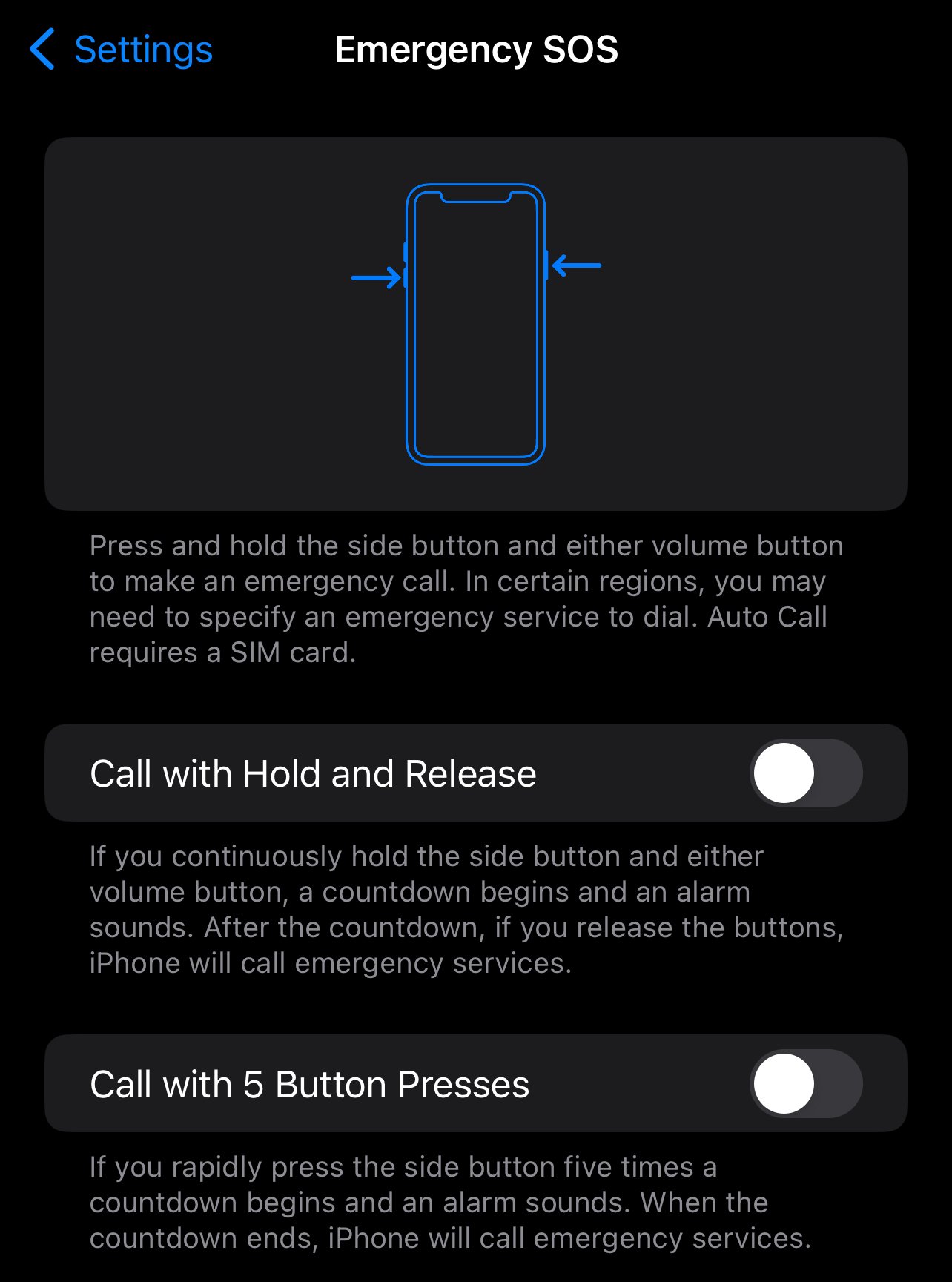Last week, the 9th Circuit Court of Appeals in California released a ruling that concluded state highway police were acting lawfully when they forcibly unlocked a suspect’s phone using their fingerprint.
You can turn that and Face ID off on iOS by mashing the power button 5 times- it locks everything down.
I’ve always wanted a setting to create a lockdown key and an unlock key. So something like middle-finger to unlock but index-finger to force it into PIN/password only mode. So you can have some convenience of a quick unlock but if an authority figure asks or forces you to unlock it you can one-tap lock it down.
That would be awesome.
In GrapheneOS, a single wrong fingerprint disables fingerprint unlock until the password is entered.
That’s not correct. It just says not recognized, and let’s you try again. I just tested it. Do you have documentation that it should work the way you said and mine is faulty?
Sorry, I misremembered, it’s 5 times instead of 20: more secure fingerprint unlock
⚠️ WARNING: On android, mashing the power button 5 times calls emergency services…
On android you can add a ‘lockdown’ mode to the power menu.
Thanks for this, didn’t know this was an option.
on my phone lockdown mode is found by pressing side button and power up at the same time, then selection lockdown from the menu
There are two ways you can do this on Android currently, but they’re not as quick. You can try to unlock with the wrong finger 5 times and it will stop allowing fingerprint unlocks. Or, you can hold down the power button for 10 seconds and the phone will reboot and also disable fingerprint unlocking.
Not on my Pixel 6. 🤷♂️ It just does what I told it to do, namely to open the camera.
Edit: these are some Reddit down votes. I just didn’t know I had this feature, and I apparently have disabled it, but I don’t remember doing so. Oh well.
Cool, you disabled the gesture. Clearly the default SO setting doesn’t apply to you…
I didn’t even know it existed. I had to search to find the setting, but I see it exists on my phone and it’s disabled. I don’t recall disabling it though.
Have to tried? On my Samsung pressing twice does the camera (as I’ve set it to) but doing 5 times tries to call emergency services.
They disabled it . I don’t understand why they even commented. It reads like some weird flex
I don’t know how it sounds like a weird flex. I was just asking. I don’t remember if it was something you could disable or not from when I had my pixel 5.
Right, correcting your incorrect information is “weird flex”. What are you, five?
On my Mi Max 3 it does not work as well. In “configure buttons” section of menu there is no call emergency number action, neither is there press [any button] five times trigger available. So clearly the function your phone has is not universal. What a wild world do we live in!
Thank you for defending me. ❤️ They were correct though. Apparently I had the setting disabled, but I don’t remember doing so. Must have been years ago on another phone? And then carried over when settings migrated? I don’t know when this feature was introduced. But yeah. It’s a thing.
But obviously not universal if you don’t have it. Which Android version are you on?
Which Android version are you on?
10 qkq1.190910.002
I didn’t even know it existed. I had to search to find the setting, but I see it exists on my phone and it’s disabled. I don’t recall disabling it though.
It’s not a flex… 🙄 I was just confused about how it seemed so established that this was an “Android” feature, so should be activated on my phone too, but it isn’t. And now that I see I have the functionality disabled but people say it’s the default, I’m even more confused because I don’t remember even seeing this setting. 🤷♂️
I did, yeah. Gotta test before commenting, of course. I see I have the setting disabled for some reason. Don’t recall disabling it though.
Android has a similar feature. It’s called “Lockdown mode” on the shutdown menu. Locks the phone and turns off any biometric unlocks.
Except it doesn’t activate by mashing the power button 5 times. On my Pixel 8, that activates the emergency dialer that will automatically call 911 if you don’t cancel the prompt in 5 seconds. I did not know that before. Probably a better use for that feature. It also points out the different ideologies of Apple vs Android.
It does the same thing on iOS, but face/Touch ID is disabled after.
You can turn off the 911 “feature.” Don’t ask me how I know 😅
My wife’s pixel 3(?) with a flaky power button had us wake up to cops knocking on the door because of that feature.
You can turn it off somewhere in the settings
Yeah, I poked around in the settings that afternoon to make sure it didn’t happen again.
On iOS, for SOS, Medical ID, and “slide to power off” you hold power and a volume button. That also disables biometric ID.
Push and hold to get the power menu on my 7.
On my 8, that just activates the Google assistant. To get to the power menu, you have to press power (oddly named button, to be honest) and vol up at the same time. But these are active acts that you have to think about and verify to make sure they did what they are supposed to. Mashing the power button 5 times is succinct. I don’t have to guess how many seconds I’ve waited. I don’t have to feel to make sure I’m hitting the vol up instead of vol down accidentally. I count 5 times, 6 to make sure, and I can drop it while being certain that it’s going to call 911. That’s what I want in an emergency. A quick distinct action that requires no guessing to make sure it works. It makes sense once you stop and think. Nothing else about the power button makes sense, but at least that part does.
Try system - gestures - press power button. I have the choice of the power menu or the digital assistant.
I could do that…but then I lose easy access to the assistant. I could set up the tap on back function, but that doesn’t work when it’s in a holder in the car. There are no options that I can find that would let me assign the assistant to open on power + vol up. Unfortunately these phones aren’t as customizable as as I’d like them to be. Or at least not by default, but I don’t want to go through the trouble of flashing a new OS yet.
I use, “hey Google,” but sometimes my car tries to answer and it doesn’t know as much stuff.
I actually didn’t know that was changeable, one of my most hated “features” of my phone that it wants to bring up an AI assistant I’ll never use and didn’t ask for when doing something that has brought up the power menu on every phone I’ve ever owned
On my Pixel 7 Pro, I press the power and volume up buttons simultaneously, then I can click Lockdown. Now my passcode is required to unlock the phone.
On my ditto (running GrapheneOS), the Lockdown option is accessible through the regular power button menu. When I press power+volumeUp it switches to silent mode. I don’t know if/where I changed this, since I can’t find the options when searching in settings.
EDIT: I just found it - in Settings > System > Gestures > Prevent ringing. I can either set power+volumeUp to mute the phone, or vibrate only. Nothing about the Lockdown option, but having it in the regular power button menu is good enough for me.
If by “regular power button menu” you mean holding the power button for a couple seconds, that was changed at least on pixel devices to bring up some bullshit called “Gemini”, some AI from googie that I never got a chance to say no to. Power + volume up is now how we get to the power menu, because of course they would change the function everyone uses occasionally to a more obscure combination without notice
“Oh shit, what’s happening? NO NO NO!”
Yup, can confirm.
I was mowing my lawn and learned about that feature. A nice ladies voice came through my bluetooth headphones asking if I needed help lol. You can change what the button spam does and I changed it to call my mom instead.
In a getting pulled over situation, this works. But do it before you go protest anything. Or better yet, leave your phone at home. You don’t want to be reaching for something while a cop is pointing a gun at you and saying “Hands up!”
Not to mention it’s pretty regular to track who is participating by checking the towers in the zone all the people are participating.
Or get a geofence warrant
☞ EFF / Surveillance Self-Defense / Attending a Protest
Didn’t know EFF had this, neat
That’s terrifying. So once we have tech to forcibly see inside the brain, that will be legal too?
You think it wouldn’t xD?
“You shouldn’t be worried if you have nothing to hide” 🤷♂️
Tap for spoiler
/s
Probably. Wouldn’t it be good to have the truth during investigations?
However I think that we really need refine when warrantless searches can occur. Right now many searches seem to be done with very little evidence to justify them. I think this protection should apply to your mind and phone just like it applies to your house. This probably also needs to be considered at border crossings. Right now they have basically unlimited rights for searching what you have on you with little to no evidence.
We should probably also rethink about how the information is shared when there is a warrant. Right now during a trial a huge amount of personal information can be made available. Maybe if it was easier to get precise information less would be needed.
Wouldn’t it be good to have the truth during investigations?
Well, yeah, but the mind is fallible. That’s why eye witness testimony usually only gets a case so far, people tend to forget specifics and fill in the gaps without realizing they did.
That is important to remember but it is sort of orthogonal to the point being made. Assuming that mind-reading worked perfectly you can find the truth about what the person believes. In most cases if they think they murdered the person and the gun is hidden behind the oak in their backyard it is beyond a reasonable doubt. I think it is still useful to have the truth about what that person believes, even if we have to remember that their beliefs are fallible.
However I think that we really need refine when warrantless searches can occur. Right now many searches seem to be done with very little evidence to justify them. I think this protection should apply to your mind and phone just like it applies to your house. This probably also needs to be considered at border crossings. Right now they have basically unlimited rights for searching what you have on you with little to no evidence.
to be fair to the current justice system, a lot of times you can just hit the courts with “excuse me sir, this was unwarranted” and assuming it was actually unwarranted, they should overthrow it immediately.
Not if it comes with a level of invasiveness that is unforgivable it wouldn’t be.
Forcibly invading someone’s mind after they were convicted beyond reasonable doubt would make you a monster.
Most trials and discoveries are already incredibly invasive. I don’t really see why the mind should be treated much differently. I would rather define what is acceptable evasiveness generally than different for mind vs written down in my diary.
Also why would you do this after they are convicted beyond reasonable doubt? This should only be done when required to reach the conclusion. Just like avoiding physical searches you can just plead guilty if you don’t want to be investigated.
If used properly this could actually be less invasive. Imagine a quick check of some facts that you believe with an automated machine that only returns the basic required information and you could be removed from the suspect list before other searches need to be done (like lawyers searching through your emails or personal notes).
I agree that this is a very dangerous thing to consider, and it needs to be applied very carefully. But I don’t think it is in the abstract any more morally wrong than the current methods of evidence gathering that we currently do. In many ways it could potentially be less harmful to the person being investigated. However it will be impossible to know for sure until we know how exactly this technology (when it is developed) works.
No, mind reading is a hundred orders of magnitude more invasive than any possible search.
There is no possible scenario where it could ever possibly be justified or excused. Your brain is unconditionally sacred. There is no possible theoretical version of such technology that could ever not be pure, unforgivable evil to use without completely uncoerced consent.
Do you have to mash it? Or will pressing it normally work?
The only thing I’ll mash is that subscribe button
NO
Pretty sure Apple would replace the buttons with pressure sensors – not for user comfort but so that they are no longer replaceable with OEM parts and can be serialized. They did literally this with Macbook sleep sensors.
You can also just long press a volume button with the lock button (with a FaceID phone). I find this harder to mess up under stress.
Assuming you have the access to do this, e.g. awake, conscious, not handcuffed, etc. It’s safer to just always use a PIN in the first place.
On Graphene/Calyx you can auto-restart the phone after a given time period if it hasn’t been interacted with. Recommend turning this on for all users.
What’s the name of this feature for GrapheneOS? I’m not finding it.
Try searching for auto reboot, or some sort of extra security settings menu.
Came here to say that! Glad it’s getting around.
Just hold volume up and power for 3 seconds.
Further advice regarding civil disobedience:
LEAVE YOUR PHONES AT HOME. Write down some numbers in case you get arrested—or better yet, memorize them. There are journalists there for documenting. And there will be plenty of other people that don’t follow this advice. Leave anything they could use as leverage over you and your cohorts away. Don’t bring ID. Don’t bring anything except what you need for the action. It’s not worth the risk.
ETA: also, any of you with a new car? DONT DRIVE THAT SHIT TO ANY MEETING OR PROTEST. They’re spying on you. Don’t post about it. Don’t use any unencrypted messaging service to coordinate it—WhatsApp is not safe. Signal and probably some other less common ones are the only ones safe enough. Ride a bike there, stash it in a conveniently hidden spot. Bring a change of clothes, plan escape routes, plant the change of clothes either hidden on your escape route or wear them under your plain clothes. Cover tattoos. Leftist activists are not safe. And literally the rest of your life could depend upon how well protected you have made yourself.
https://www.theguardian.com/us-news/2022/feb/10/felony-charges-pipeline-protesters-line-3
So many states have pretty quietly passed laws to make you a felon for protesting. Even peacefully. And to make you a fuckin corpse. In the south especially, a few states were writing “go ahead, run over any protester in the road” laws.
Be smart. Be safe. Have a plan. Have a contingency plan. This isn’t “fuck around with the blunt end of the justice system and find out” territory, in 2024 US, it’s time to be as safe as you can while doing what’s right. Because doing what’s right is criminalized. Heavily.
If you’re going somewhere where you think you might be at risk, IMHO, it’s probably just easier to turn your phone off. Android and iOS both require a non-biometric passcode after boot.
Or, if you want to keep your phone on, enable lockdown mode on Android, or tap power 5 times on iOS to require a non-biometric password at the next unlock.
It’s never a good idea to bring your phone with you. It can be used, even while powered off, to track and surveil you. The BLM protests were just the tip of the iceberg. The apps you have on your phone track you. The government is buying that tracking data. Your phone is a massive privacy weak point. It’s basically a bug you carry on you willingly. It’s not safe. Period.
https://www.vox.com/recode/22565926/police-law-enforcement-data-warrant
Leave your phone at home. It’s not worth it. It may not bite you in the ass the day of, but could very easily come back to haunt you after they investigate, in case anything goes “wrong” in their eyes. It’s just not worth it.
IMHO, as someone that works in security / privacy, I tend not to view it as a binary thing. It depends on where you live, what you’re protesting, what you look like, who you are, etc.
Are you in Russia or China and are protesting the government? Yeah, I might leave that thing at home. Are you a white lady in San Francisco marching with a pink knit cat hat during brunch hours, then you’re probably well on the other side of the risk spectrum. You might actually be introducing more risk by having less immediate access to communication or a camera.
IMHO, it’s nuanced.
The problem is that the people doing the surveillance are hardly going around honestly telling people what’s their surveillance profile.
For example in the UK that “pink knit cat hat white lady” would very likely be under surveillance if she was a member of the Green Party and participated in demonstrations. In fact, recently a number of cases came out where in the 80s and 90s the police had infiltrated Ecologist groups and even left some of the women in those groups pregnant with the children of men they late found out were undercover agents.
Further, the lower the barrier to entry to surveillance the lower the “threat profile” needed to end up under surveillance: if the authorities have already have well established and commonly used processes backed by ultra-broad surveillance court (or whatever those courts are called in your country) orders to just get from the mobile network providers all the phone numbers that connect to specific cell towers during a specific time period (such as the ones nearer a demonstration during that demonstratiom), pink knit cat lady is going to end up in the list just as easilly as baclava-wearing hard-core anarchist looking to break stuff.
They might not hack the pink knit cat hat lady’s mobile to install eavesdropping software, but she’s still in the list for every demonstration she attended carrying her phone and for the authorities finding out those who were at multiple demonstration and cross-searching with other databases to resolve those numbers to actual identities is pretty easy unless those people jumped through hops to keep those things disconnected (which, funny enough, smart anarchists are more likely to have done than your average pink knit cat hat lady)
I agree with your point, but balaclava is the hat, baclava is the delicious Greek pastry.
baclava-wearing hard-core anarchist looking to break stuff
what an image though 😁

We take on risk every time we decide to wake up and start the day.
I live in a place where I’m considerably more likely to get hit by a car while walking than thrown in jail as a political prisoner. That doesn’t mean I’m never going to go for a walk. I’m going to live life.
Leaving my phone at home seems pretty silly when the risk is very low in my nation and I do riskier things while cooking dinner.
Oh, in day to day usage I agree with you: we’re all one little uninteresting datapoint in a whole lot of datapoints and there are plenty of other ways in which we are tracked.
However if you’re part of a Political Party or Movement and/or attend demonstrations, it’s probably wiser to leave the phone at home, if only because that makes you stand out as a much more interesting datapoint than average.
I think the fact that we are able to record everything that happens and automatically upload it seriously outweighs what you are saying.
The only reason cops get in trouble is only because people are filming. If it’s not caught on camera, it didn’t happen in the eyes of the law if it’s just our word against a cops.
It’s your life. This advice is important in more active circles. There are also jobs that should be given out. Just like there are medics that come out, there should be journalists—in leftist action circles, this isn’t EMTs and NBC photographers. See what I’m saying?
It’s ultimately your choice. But depending on what’s happening, the cause, the state, the cops, the current state of the govt of the country, etc., this advice can literally be invaluable.
For 200-250$ you can get very decent used compact cameras (like the RX 100). It won’t upload the photos immediatly, but it is still pretty much on par with most current cell phones.
It can be used, even while powered off, to track and surveil you.
How? The only legit thing I can think of is if they are tracking you anyway, and then they see your phone is turned off, they might try to claim that you must be up to something. But they won’t be able to track it while it’s off.
If you can’t take out the battery, it’s never actually off.
That’s not quite how it works, though. These devices are basically mini computers now, there’s a limit to what they can do without fully booting. Devices that are plugged into the wall might be likely to retain some power-draining function while plugged in, but there’s only so much you can do on a trickle charge while a phone is powered off.
They’re still running in low power mode and can wakeup from the network so they can absolutelly be made to “boot up” without turning the screen on and you being aware of it.
This is not like a bloody PC were the lights turn on and you can hear the fans when the thing starts, it’s a machine with a low power mode in which it can already do a lot and which can be brought to a high power mode if needed without there being any visible or audible side-effects to alert the user.
Unless you completelly cut it off from power (by taking the battery out, which you can’t in most modern smartphones) that smartphone with the lights off, the screen off and making no sound at all can just as easilly be in low power mode waiting for you to press the On button, as it can be in full power mode with a mobile network connection active, accessing the microphone and the GPS microchip and sending that data out, and both will look exactly the same from the outside.
I think you are overestimating what these devices can do when turned off, specifically when whoever is doing the tracking wants to be covert. Devices like Cellular Radios and GPS chipsets are getting more efficient every year, but they still consume enough power that it would be noticed if they came on by themselves even if the device was off.
let’s put aside everything @[email protected] wrote you; if the French state was trying to legalize exactly this, it must be possible: la validation pure et simple de l’activation à distance des fonctions de géolocalisation de téléphone et autres objets connectés (voiture, balises airtag, montre etc) qui repose exactement sur le même procédé technique que le dispositif censuré : la compromission d’un périphérique, en y accédant directement ou par l’intermédiaire d’un logiciel espion pour en prendre le contrôle à distance.
wasn’t the scandal about the Pegasus spyware all about this imperceptibility?
Nothing in your links above indicate that the spyware operates while the phones are powered off (although I relied on a crappy translation of the French). Could spyware mock the shutdown process so that it looks like the phone is powered off while the phone is actually running? Sure it can, but the victim will be tipped off when the phone’s battery is being drained even while it is “shut off”. (And someone who is paranoid enough to shut down their phone would pay attention to that.) . It seems like it’s not worth the effort.
read, listen to people that were spied on using the pegasus software. Easy to find
i don’t know if you’ve met any real activists, militants in your life but they’re rarely geeks. And checking the battery of their phone or reading about battery life isn’t one of their priorities
Yes, info on Pegasus is easy to find. And never says Pegasus is active when the phone is powered off. It’s undetectable and insidious in what it can grab, but at no point is there any reference at all to being active while the phone is powered off.
https://en.m.wikipedia.org/wiki/Pegasus_(spyware)
If you have a reference that states otherwise (that isn’t written by an AI), please supply it. I’ll be happy to give up on this if someone can prove their point.
And that is because it is way too easy to detect when the phone is off, not only because of the battery drain, but because the radios would be transmitting when they shouldnt . Plus, persisting across a reboot requires some trace of the Trojan to be on physical storage, which is more likely to be found on a scan.
I am assuming that when a state-level actor is hacking a phone, they are targeting a person directly, and know how to get the Trojan on undetected. Their main goal will be to continue to siphon data off it while it is in use. It’s not worth the risk of detection to track it while it is off (and not being used, after all.) Don’t you think they would prefer to use the same method they used the first time to infect the burner phone that’s actually being used?
The concern with bringing your phone is that police have subpoenaed cell providers to force them to turn over cell tower records. The police then used the lists of cell phones connected to those towers to track down protestors.
You shouldn’t bring your phone to a protest because it could end with police kicking your front door in three weeks after the protest has wrapped up.

And completely cover any tattoos. Even more identifiable than your face, honestly.
you can always modify your tattoos, you can’t modify your face once it’s identified. I saw a man literally draw a face on his face before attending a protest. He looked ridiculous but perfectly “defaced”.
I’ve also read about some blackBlocs getting identified, where i live, through their shoes. Police photographed people before and after the movement and their shoes are used as identifying information.
There is always the oldBloc who put their faces and names behind their words and proudly struggle through unions.
it’s already may 1st here. They will be out in about 10 hours. May the force be with them.
Maybe get a dumb burner phone with no personal data on it. You could potentially keep your main phone in a secret/secure pocket.
keep your main phone in a secret/secure pocket.
Terrible idea, it will be found with absolute certainty if you’re arrested.
No. Several Jan 6 participants tried burners and they still got caught because the burners were still linked to their movements and activities and their personal phones were unusually unused/off/immobile for the amount of time the burners were used. You would have to expend a lot of effort to make sure your burner was completely disconnected from yours and your phone’s location, as well as making sure your phone showed signs of appropriate activity in your absence.
Not so easy.
Just having a burner phone works against dragnet surveillance if one is not doing really stupid shit like logging in to one’s personal social media accounts from one.
If however it’s an actual crime which actually gets investigated by actual criminal investigators, they’re going to be coming at it individually and using much more specific techniques than just “use a surveillance warrant to get a list of all mobile phones that connected to certain cell towers at certain points in time and plonk them all on a database to cross-check with similar data from other demonstrations”.
You can’t just treat a burner phone as a second phone that you have active anywhere near your home, place of work or places you normally frequent and you can’t just keep it and keep on using it for a long period of time: the longer one holds on to that burner phone the more data points there will be that can be bulk checked with other, identifyable, data from other sources (say, car tracking data) to find out a more than normal overlap.
I wouldn’t at all be surprised if those people with the burner phones had them with them active whilst ridding their personal vehicles which had something like OnStar or were dumb enough to log-in to their Facebook account from them.
The article pretty plainly says the guy was coerced into entering his password. So the headline feels a bit manipulative.
The headline is click-bait. I honestly don’t know why people still read this crap.
So he was “only” coerced, ie likely verbally abused and lied to (which cops are allowed to do) about the consequences of refusing to unlock, instead of being physically forced. Such freedom.
What’s that got to do with using a thumb to unlock the phone?
“The general consensus has been that there is more Fifth Amendment protection for passwords than there is for biometrics,” Andrew Crocker, the Surveillance Litigation Director at the EFF, told Gizmodo in a phone interview. “The 5th Amendment is centered on whether you have to use the contents of your mind when you’re being asked to do something by the police and turning over your password telling them your password is pretty obviously revealing what’s in your mind.”
Sure, but what does your original comment have to do with the thumbprint?
The cops can coerce or force you to use biometrics to unlock your phone, but they can’t coerce you into giving up your passcode without a warrant.
deleted by creator
Ya know… I hadn’t see anything by them in so long I forgot.
deleted by creator
Lemmy quality descended quite quickly. What’s the more intelligent tech community alternative besides hacker news?
It seems everything descends into this samey mess of america bad, eat the rich which I don’t dispute with but I am here for tech and not politics honestly. Time and place for everything.
The amount of low effort comments that seem to only be about points/validation which aren’t even visible for some is tiring.
It used to be that you would look into comments for useful information about the posted article. Now you can skip the comments altogether and the posted links quality also became questionable.
I miss times where you could find links to some niche but full of creativity/usefulness websites in the comments or posts. Those juicy gems of the web. Or learn some fact that you had no idea about.
I want to learn something new being here. Not make my brain feel good with the reward of validation.
Probably because America bad, eat the rich.
What’s the more intelligent tech community alternative besides hacker news?
But it’s invite-only.
Take a deep breath and tell us how you really feel ;-)
I got here a bit late and it seemed like there was some decent discussion going on. Practical advice on how to lock various phones.
Some high quality pasta about how to survive the coming civil war ;-) Honestly good advice for anyone considering civil unrest there.
It’s small, but what’s really missing here? Someone dragging up the constitution? Being forced to incriminate yourself is wrong and any evidence gleaned should be inadmissible. Cops shouldn’t manipulate people into giving up their rights… but that’s the country we live in.
Reddit was a wash in low effort feel good upvote nonsense too. It just got buried faster.
To each his own but until I have time to post a bunch of high quality content, I’m not going to complain so bitterly.
I am just annoyed that those sites became so mainstream that’s all. It always gets shitty then but if it is really good it is unavoidable.
I guess the key is to make it bad enough so normal fans won’t touch it but good enough so that some of us enjoyers will enjoy it
I think they were victims of their own success weren’t they? Gawker was already kind of a tech-tabloid, happy to report rumors (which were often true or at least truth adjacent).
That kinda made them popular with both hardboiled techies who wanted to know when my shit was going to come rolling down, and regular folks who just wanted some good gossip… maybe wanted to touch our feet or whatever ;-)
With that success and the capital investment it garnered Gawker bought up all the good tech news sites.
Unable to produce meaningful content for that many sites on the limited budget their investors demanded Gawker invented the listical. And humanity wept —and kept clicking for some damn reason 🤨
Many years passed and the listical was clearly dying, so Gawker sought out a real zinger to boost their profile… I’m a bit hazy on the details, but it sounds like Peter Teal fucked them up the ass with Hulk Hogan‘s penis. 
At least that’s how I remember it ;-)
and this is why lemmy is a limp-wristed do-nothing. too many people here want to stick their head in the sand. but by all means, pls share some more star trek memes.
I mean I have curated my ‘All’ only to non world news and non memes comms and I was left with literally nothing except this community. There is literally nothing here :/
I will still keep using it whenever I can though just out of principle and to curb some of my Reddit addictions.
I am sorry to say nowadays 95% of content appears to be meaningless. Not contributing anything, not creative, not even funny lots of the times. I won’t sugar coat this
but tech news ad nauseum is ‘meaningful’. lol okay.
See I have this weird feeling that we are too different to even connect somehow. You didn’t even read my comment. Any benefit of doubt of mine is pointless when you just throw some out of place, bland one liner and don’t even want to discuss anything. It’s like talking to a wall
I don’t want to have a discussion. I want to unify a disgruntled public so we can make change for the better. Get friends if you just want to have a discussion. All I’m here to do is to get you to say it with me:
EAT. THE. RICH.
However, the panel said the evidence from his phone was lawfully acquired “because it required no cognitive exertion, placing it in the same category as a blood draw or a fingerprint taken at booking…"
If the precedent is that unlocking the phone is the same category as fingerprint taking, well, what happens if you refuse to be “coerced” into having your prints taken? Even if the legal precedent isn’t fully understood, it looks like the reasoning here isn’t based on whether there was physical force applied, but whether the search required the contents of the person’s mind.
I do t know about fingerprints but I thought a blood draw required cooperation or court order
In many (if not most) US jurisdictions, operating a vehicle under a driver’s license specifically implies consent to a blood draw when under suspicion of impaired driving.
It’s frustrating to no end that fingerprints and face ID are treated like passwords when they should be treated like usernames.
That makes a lot of sense !
They make sense as a 2FA. It would be really cool if I could require either PIN+fingerprint or a long recovery password.
## How to disable Face ID through the Power Off screen
- Hold down both the Side Button and either Volume Button at the same time for three seconds.
- The Power Off slider should appear. Tap Cancel.
You actually don’t need to hit cancel, you can just hit lock, so you can do this whole thing with your phone in your pocket.
https://appleinsider.com/inside/iphone/tips/how-to-quickly-disable-face-id
This is easier and less intrusive than the lock-button-5-times method because it doesn’t start making a phone call that you have to quickly cancel.
This is the advice people (with iOS) should follow, not disabling biometrics altogether. Using FaceID or TouchID prevents shoulder surfing to find out what the password to your phone is. When local passwords have so much control over a device, using biometrics to prevent anyone from seeing what your passcode is is very useful.
Those settings can also be altered under Settings > Emergency SOS

Real MVP right here. Good to know!
This also encrypts your data.
deleted by creator
FYI Androids have a feature for this. If you are ever forced to interact with a cop you can press the side button and volume up(might be different on other phones) to select lockdown which will force your phone to only be opened with the password. Its gross that we need this feature, but now you know.
iPhones do this too. Hold the lock and volume down button until your phone buzzes, to get to the SOS/reboot screen. Once that screen is activated, it’ll disable biometrics until the passcode is entered.
You can even take photos/videos with the locked phone, and the recordings won’t be able to be deleted from your iCloud until the passcode is entered. Handy for recording cops. Cuz even if they take your phone and delete the recording, it’ll still sit in your “Recently Deleted” for 30 days. And while the phone is locked, they can’t access that Recently Deleted folder to permanently wipe it. So you can just access your iCloud account from any computer and recover the “deleted” footage.
iPhones also have this feature, for a long time now:
https://ios.gadgethacks.com/how-to/keep-law-enforcement-out-your-iphone-your-privacy-intact-0194999/
Rather irresponsible of the article to not point out these features on Android and iPhone. Did a cop or government official write that article?
Most likely just a written with little real tech experience.
It’s good that they have this, but there are a lot of situations involving cops where it’s not going to be safe to stick your hand in your pocket. I’ll just leave the biometrics off on my devices.
Yeah, but I want a combo that force starts the feature. I want to pull out my phone and be able to blind start it, not stare at my screen to select the correct thing.
Same, but this is our only option unfortunately.
I have Button Mapper trigger a Tasker task that locks my phone when I hold the volume down button, for some reason Button Mapper’s lock doesn’t trigger a lockdown.
(Tap and hold still lowers the volume)
Edit: Maybe:
You can instead hold the power button for 1 second to open the same menu. Feels easier to me.
Usually that just launches the Google Assistant on most new phones.
Ah, I don’t use that on my Pixel 7 Pro, so it gives the old menu.
Jesus christ this explains why occasionally I’ll pull my phone out of my pocket and it forces me to input the pin rather than the thumb print. It’s just one of those mildly annoying things that you wonder about but don’t think about enough to search for the answer.
Your situation is more likely to be caused by Android’s system to make sure you don’t forget your pin. It has a number of unlocks (and a length of time) before it forces you to do the code.
It’s* gross
Great contribution.
Maybe don’t live in a fucking dystopia. The US is a police state and you have no freedom left.
Removed by mod
While I buy you’re general cynicism, it’s wrongly applied here …
It seems like we have both more and less protections than other places, for this instance.
- while it’s not entirely settled case law, you can NOT be compelled to give up your passwords. Different states differ and they’re constantly trying
- however biometrics are counted as public knowledge, so you have no protections
This is more of a scenario where legal contortions turn into huge inconsistencies, plus our legislature has refused to clarify so it’s all on the court system
Terrible article. Even worse advice.
On iOS at least, if you’re concerned about police breaking into your phone, you should be using a high entropy password, not a numeric PIN, and biometric auth is the best way to keep your convenience (and sanity) intact without compromising your security. This is because there is software that can break into a locked phone (even one that has biometrics disabled) by brute forcing the PIN, bypassing the 10 attempts limit if set, as well as not triggering iOS’s brute force protections, like forcing delays between attempts. If your password is sufficiently complex, then you’re more likely to be safe against such an attack.
I suspect the same is true on Android.
Such a search is supposed to require a warrant, but the tool itself doesn’t check for it, so you have to trust the individual LEOs in question to follow the law. And given that any 6 digit PIN can be brute forced in under 11 hours (40 ms per entry), this means that if you were arrested (even for a spurious charge) and held overnight, they could search your phone without you knowing.
With a password that has the same entropy as 10 random digits, assuming no further vulnerabilities allowing them to speed up the process, it could take up to 12 and a half years to brute force it. Make it alphanumeric (and still random) and it’s millions of years - infeasible within our lifetime - it’s basically a question of whether another vulnerability is already known or is discovered that enables bypassing the password entirely / much faster rates of entry.
If you’re in a situation where you expect to interact with law enforcement, then disable biometrics. Practice ahead of time to make sure you know how to do it on your phone.
Or they make a copy of your phone, alphanumeric password and all, and just sit on it for ten years until quantum computers make solving the password a piece of cake.
You should assume that any device confiscated by authorities will be copied and broken into eventually. Treat all data on said device as if it’s already compromised.
Copying an iPhone isn’t as straightforward as you seem to think. Copying data from a locked iPhone requires either an exploit or direct access to the SSD / memory chips on the device (basically, chip-off forensics, which likely requires bypassing the storage controllers), and I assume the same is true for Android devices.
I’m not saying such exploits don’t exist, but local police departments don’t have access to them. And they certainly don’t have the capability to directly access your device’s storage and then reassemble it without your knowledge.
Now, if your device is confiscated for long enough that it could be mailed off to a forensics lab for analysis? Sure, then it’s a possibility. But most likely if they want your data that badly they’ll either hold onto your device, compel you into sharing the info with them, or try to trick you into giving it to them. Hanging onto your data without a warrant for over a decade is a high risk, low reward activity.
Your data’s more vulnerable to this sort of attack in transit.
deleted by creator
Also, don’t use regular passwords with random letters and numbers, they are really hard to remember and easier to crack if the password isn’t complex enough. Instead, use a passphrase with at least 5 words.
Is that safe though? After seeing that XKCD I also thought it would be a good idea but then read that using passphrases is even worse because brute force attacks often use dictionaries as well to test word combinations, so one should use scrambled characters, just long enough to resist brute force.
The XKCD comic uses the entropy of common words assuming an informed cracker is using the best tools at their disposal, that being a dictionary attack. That’s why the entroy per character of the passphrase is so low compared to that of the special character password, but the passphrase can be much longer because it’s easier to remember, so that’s what gives it its higher total entropy.
Explain XKCD goes into more detail about how the calculation was done: https://www.explainxkcd.com/wiki/index.php/936:_Password_Strength
Thanks for the clarification. So I can surmise that length is everything then? Given that I use a password manager I’ll just stick to my long gibberish passwords in that case, but it’s good to keep passphrases in mind for use cases where I can’t copy/paste easily.
Oh yeah, long gibberish passwords are strong. Keepass will tell me I have 137 bits of entropy on my password for instance, and that’s proper secure.
The Tr0ub4dor or whatever example in the comic assumes again an informed hacker using long random words and common substitutions, so you don’t have the full 56+ possibilities per character, it’s constrained to a very limited set. This is a pretty common password construction
For instance when I was in IT some government agency required our company to adhere to some security requirements before we could handle their data. Everyone went from 3-letter usernames + identical passwords to having a long word + numbers + characters. HOWEVER because nobody can remember these fucking things, every single password was a home address with the exception of a handful of month or person names which I assume were birthdays or kids. How do I know these secret passwords? Well, because they STILL couldn’t remember them, we had to…
I’m so sorry.
…keep everybody’s password in our own encrypted excell spreadsheet, so if anybody forgot, the IT team could read them all in plaintext to get people logged in. One person was so bad at remembering that I had their password memorised myself, and when I stopped pretending to look it up they stopped asking. Idk if they were shamed into remembering it or they just kept it in their wallet or something.
Also we needed secure server racks and encrypted drives etc. The server rack was a doozy - the handle was an intentional weak point to prevent forcing the lock, so I accidentally ripped it clean off with my bare hands one morning when the lock was slightly stuck. It took a while to get that fixed and I was exremely lucky I managed to jimmy it open using the nub of the destroyed handle. I couldn’t close it again so it sure wasn’t secure once that happened.
Security theatre, the lot of it. We spent six figures nationwide getting ready for that contract and the work they gave us was about four figures worth.
The entire corporate world is like this. If you wonder why your data keeps getting breached, this is why.
Article doesn’t even mention PIN. Where are you getting this “advice”?
It calls them “passwords,” but personally I don’t consider a 6 digit number to be a password. And according to this article on GrayKey, 6 digit “passcodes” became the norm back in 2015. I haven’t seen any stats showing that people on average use more secure passcodes now, and making the passcode required more frequently isn’t going to encourage anyone to use one that’s more secure.
The article just says “disable biometrics” which is bad advice for the average person, as it will result in them using a 6 digit passcode. This is a knee-jerk reaction at best, and the resulting advice is devoid of nuance, made by someone who clearly doesn’t understand the threat discussed in the article, and would benefit literally nobody who might feasibly take it.
My advice is echoed by the article above, but it’s based off having an understanding of the problem area and suggesting a solution that doesn’t just address one thing. Anyone giving advice on the topic should consider:
- known threats and reasonably likely unknown threats
- the mitigations to those threats
- how the technology works for both the threats and the mitigations
- the legal landscape in your jurisdiction - for us, the US - both in practice and in theory
- people’s attitudes toward security, namely their willingness to suffer inconveniences for its sake
- how all of the above interact, and how likely someone is to take the advice given in a way that improves their security overall
The author of this article considered none of the above.
I still don’t get where are you seeing this advice in the article. No one is recommending “6 digit passcodes”. AFAIK all contemporary phones use mixed character passwords these days. I just setup a second hand s22 and it asked me to create a full password as primary authentication with all of the brute force strength hints etc.
Your perception might be a bit outdated here.
As I said in my first comment, I’m more familiar with iOS, where 6 digit passcodes are the default.
That said, do you genuinely think the average person would use a random 10+ alphanumeric character passcode to unlock their phone after taking the advice of this article and disabling biometric auth?
Yes the contemporary phones literally bug and warn you if you don’t. Password is much easier to remember than 6 digits too imo.
He’s not wrong though. Brute forcing number only pin takes little effort.
Yep. On Android there’s also a Lockdown mode that you can enter through the power menu when you need to turn off biometrics for the next unlock. Set a strong password. Use biometrics when you need to keep out a casual intruder, and password when you need to keep out a major intruder.
100%.
If you’re always concerned about sophisticated attackers, then you should also:
- Disable biometrics unlock whenever your device is about to leave your possession or you’re going to sleep
- Protect against shoulder-surfing / surveillance attacks that can capture you entering your password, e.g., by being aware of your surroundings and only entering your password or viewing sensitive information when you‘re certain your screen (and thumb locations) can’t be observed or by obscuring a view of your phone with your shirt or a blanket (like Snowden)
- Take the time to learn more about security in general and in relation to the specific threats that concern you
On pixel, if you ever need to - press and hold the power button, select “lockdown”.
(It might apply to other androids too, I don’t know.)
You will now need a pin to unlock the phone. This disables the lock screen shortcut (camera, light, etc) as well.
Why disable your convence features for an scenerio that is not likely and can be quickly and easily be prevented.
Universal: You could also just the tap the sensor with a “wrong” finger a few time, and the pin will be required.
Maybe don’t do this one in front the cops…if you find your self in a postion where they are trying to unlock your phone, you probably don’t want to piss them off. .
Edit: I’m surprised no one called me out on “if you’re ever need to”. The sentence was going to be “if you’re even in a situation that needs…”, but that was getting too long. Forgot to change you’re to you.
On my pixel 6 it is power + Volume Up to access the power menu with lockdown.
I also have a pixel 6 and holding down power also works, though you have to wait a second. Power and volume up is instant.
My power button long press only activates Google assistant, it never pops the power menu. Maybe it’s a setting somewhere.
Oh, yeah I think you’re right. I think I might’ve changed it at some point.
Just checked and it’s under system > gestures > press and hold power button
On iOS just rapidly press the power button five times and it enters its lockdown state.
The Pixel fingerprint scanner is so bad, you could end up locking it entirely by accident.
Behind-the-screen fingerprint scanners are an abomination.
My 5a sensor is fantastic (it is on the back). I’ll be sad when it’s time for this phone to go.
Mine works without issues since I removed the white circle and the unlocking animations.
Behind-the-screen fingerprint scanners are an abomination.
Always reminds me of 1984’s telescreens. We’re almost there.
Not my experience. They are usually instant, but you need a flagship device, of course. Otherwise it’s comparing apples and oranges.
The $1000 price tag on the Pixel tells me it’s a flagship device and yet the scanner is still trash.
But optical scanners just suck in general. I wish they’d bring back the rear sensor, it was so convenient both for unlocking and for having a shortcut to pulling down the notification shade.
First gen in-screen scanners were absolute trash. Borderline unusable. But the tech has improved quite a lot since the first ones. The one in my galaxy tab s9’s screen is fast and accurate.
This was new info to me! Can confirm it works on a Pixel w/ GrapheneOS
It’s from AOSP, so any device close to the actual Android baseline should support that. This means that you can enter that mode from LineageOS as well.
I have a motorola razr (basically stock android) and I have the ability.
I’ve avoided willingly using biometrics so far. Though I’m sure our faces, gaits, body shapes, etc, are all stored somewhere, willingly or not.
Say no to biometrics. It’s like having a password you can never change.
So, it really depends on your personal threat model.
For background: the biometric data doesn’t leave the device, it uses an on-device recognition system to either unlock the device, or to gain access to a hardware security module that uses very strong cryptography for authentication.
Most people aren’t defending against an attacker who has access to them and their device at the same time, they’re defending against someone who has either the device or neither.
The hardware security module effectively eliminates the remote attacker when used with either biometric or PIN.
For the stolen or lost phone attack, biometric is slightly more secure, but it’s moot because of the pin existing for fallback.The biggest security advantage the biometrics have to offer is that they’re very hard to forget, and very easy to use.
Ease of use means more people are likely to adopt the security features using that hardware security module provides, and that’s what’s really dialing up the security.Passwords are most people’s biggest vulnerability.
I’ve read all this before. If you believe the people who designed and implemented the device and its myriad layers of firmware and software were 1. All acting in good faith and 2. Knew WTF they were doing… then: yes, sure.
Unfortunately that’s way too many strangers for me. Hundreds of people design and code these things. Meanwhile, every week there’s a clever new breach somewhere.
While I do respect that viewpoint, there’s a lot more independent scrutiny of the hardware modules than there are around the parts that would handle any other authentication mechanism you might use.
Pixel phone example iPhone example
Just because something isn’t perfect doesn’t mean we should keep using the less good thing that it replaces.
Use the PIN if that’s more your cup of tea, just so long as you move away from passwords, since it’s the HSM that’s the protection, not the biometrics. Those are just to make it easier than passwords.
You can change PINs and passwords, but you cannot change your biometric data.
It’s about as smart as using your SSN as your username.
The point being that most people do not need to ever change their biometric data, because it isn’t used for remote authentication.
It’s about picking the right threat model, and for most people anything that gets them using the HSM is an improvement to their security.
If you’re that afraid if the people who build phones, why are you ok with using any device that can access the internet?
I like how being cautious with my biometric data is beung framed as irrational fear and paranoia. As if ID theft never happens.
You should be more worried about your local doctor’s office contracting some cheap-ass company to handle your data and ending up in a branch than being concerned about biometrics.
Or hell, Experian had that insane breach of basically everyone’s information years ago. Biometrics are not the problem, it’s smaller companies that you have to deal with all the time skimping on security because they think they can’t afford it.
And then companies even more shady than Google and Apple and Samsung (loan companies, health systems contractors, banks, credit card companies, insurance companies) have all your data and are more likely to be involved in a data breach.
Using biometric data to unlock your phone does not make you more vulnerable to petty criminals.
Password you can never change
Not with that attitude! You can absolutely change your face. its rather inadvisable
Face… off…
it’s not a password; it’s closer to a username.
but realistically it’s not in my personal threat model to be ready to get tied down and forced to unlock my phone. everyone with windows on their house should know that security is mostly about how far an adversary is willing to go to try to steal from you.
personally, i like the natural daylight, and i’m not paranoid enough to brick up my windows just because it’s a potential ingress.
It’s not a great analogy. Your house and its windows are exposed to your neighborhood/community. Your internet device is adjacent to every hacker on the web.
it’s an analogy that applies to me. tldr worrying about having my identity stolen via physical access to my phone isn’t part of my threat model. i live in a safe city, and i don’t have anything the police could find to incriminate me. everyone is going to have a different threat model. some people need to brick up their windows
Assuming the phone’s security works as intended, what you’re saying is true. However, it’s a legit concern that the security is not airtight, and physical access is not actually required to harvest your biometric data.
I know the phone manufacturers make all sorts of claims about how secure biometric data is, but they have a profit motive to do so. I’m not being brick-up-my-windows paranoid by pointing out all the security failures and breaches we’ve seen over the years. Companies that have billions on the line are still frequently falling short at securing their own assets, much less their customer’s data.
I understand biometrics are convenient, and many folks love the ease / coolness factor of using them. Just don’t kid yourself that it’s secure by requiring your physical phone. Once the dark web has a digital copy of your biometric data, it’s compromised forever.
like i said, it’s more of a username than a password
First provide proof that you can pull out biometric data out of a secure element in a phone.
That’s not retrieving the biometric data from the device, that’s retrieving the biometric data from surveillance or physical interaction.
It’s quite specifically the type of threat that most people do not need to worry about.
That’s why I put Linux on my house.
Joke’s on them. My yo-yo diet keeps me safe from accurate body shape biometrics.
Same here. Still using the pattern lock. I’ve never used fingerprint not to even mention face scan.
Why does this comic always give me Lain vibes
A stipulation of Payne’s parole agreement was that he be willing to provide a passcode to his devices, though that agreement didn’t explicitly refer to biometric data. However, the panel said the evidence from his phone was lawfully acquired “because it required no cognitive exertion, placing it in the same category as a blood draw or a fingerprint taken at booking, and merely provided [police] with access to a source of potential information.”
These both seem like bad calls. You have a right to privacy, right? And for police to access your files/home/phone tap requires obtaining a warrant.
Fingerprints at booking gives access to public records. Not your own personal private data. Pretty sure drawing blood is justified suspicion of DUI.
Yes and no. When you take parole, you agree to give up some freedoms in exchange for getting out of prison early. For example, taking drug tests, checking in with your parole officer, or not leaving the state/country. If your crime was related to using a phone or something, like being a drug dealer, then it can make sense to have to allow your parole officer to check it.
So after you have been convicted of a crime, you will have restrictions based on that crime. That’s a world of difference from pulling over Bob and forcing him to unlock his phone.
No.
deleted by creator
You can also just hold a volume button + power. That will bring up the power / emergency screen and will require a non biometric password for the next unlock.
For Android: learn the hard reset combo for your phone, especially if you encrypt it.
After rebooting, pattern/PIN will be required to decrypt the phone. Biometrics won’t work for this step. This is what graphene does for security, tries to keep the phone in a “before first unlock” state by rebooting on a timer. You can’t even read anything over USB/ADB, it’s scrambled until you unlock the phone.
The only drawback to just keeping your phone in this state is none of your apps are loaded, so no notifications/updates/processing at all.
Just power down your phone. No phone allows initial unlock with bio data
You don’t even need to do that. You can go to the power down menu on Android 14 and select lockdown. Even from the lock screen without unlocking the phone.




































